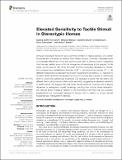Elevated sensitivity to tactile stimuli in stereotypic horses
Abstract
Although stereotypic behaviours are a common problem in captive animals, why certain individuals are more prone to develop them remains elusive. In horses, individuals show considerable differences in how they perceive and react to external events, suggesting that this may partially account for the emergence of stereotypies in this species. In this study, we focussed on crib-biting, the most common stereotypy displayed by horses. We compared how established crib-biters (“CB”=19) and normal controls (“C”=18) differed in response to a standard ‘personality’ assessment test battery, i.e. reactivity to humans, tactile sensitivity, social reactivity, locomotor activity, and curiosity versus fearfulness (both in novel and suddenness situations). Our analyses showed that crib-biters only differed from control horses in their tactile sensitivity, suggesting an elevated sensitivity to tactile stimuli. We suggest that this higher tactile sensitivity could be due to altered dopamine or endogenous opioid physiology, resulting from chronic stress exposition. We discuss these findings in relation to the hypothesis that there may be a genetic predisposition for stereotypic behaviour in horses, and in relation to current animal husbandry and management practises.
Citation
Briefer Freymond , S , Bardou , D , Beuret , S , Zuberbuhler , K , Bachmann , I & Briefer , E F 2019 , ' Elevated sensitivity to tactile stimuli in stereotypic horses ' , Frontiers in Veterinary Science , vol. 6 , 162 . https://doi.org/10.3389/fvets.2019.00162
Publication
Frontiers in Veterinary Science
Status
Peer reviewed
ISSN
2297-1769Type
Journal article
Collections
Items in the St Andrews Research Repository are protected by copyright, with all rights reserved, unless otherwise indicated.

